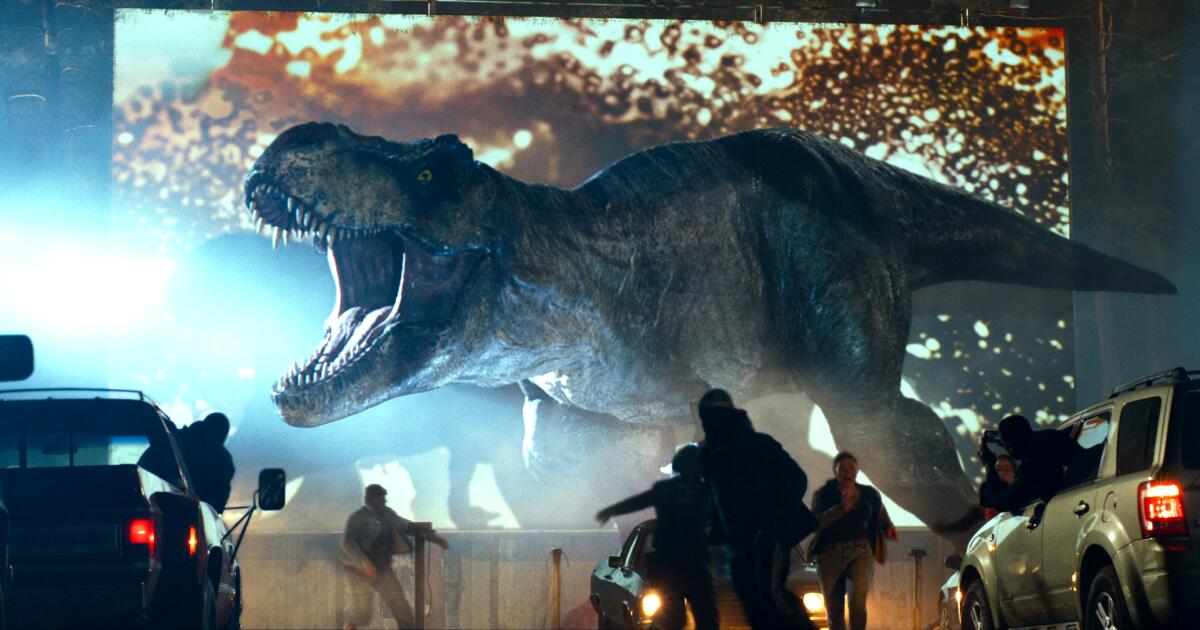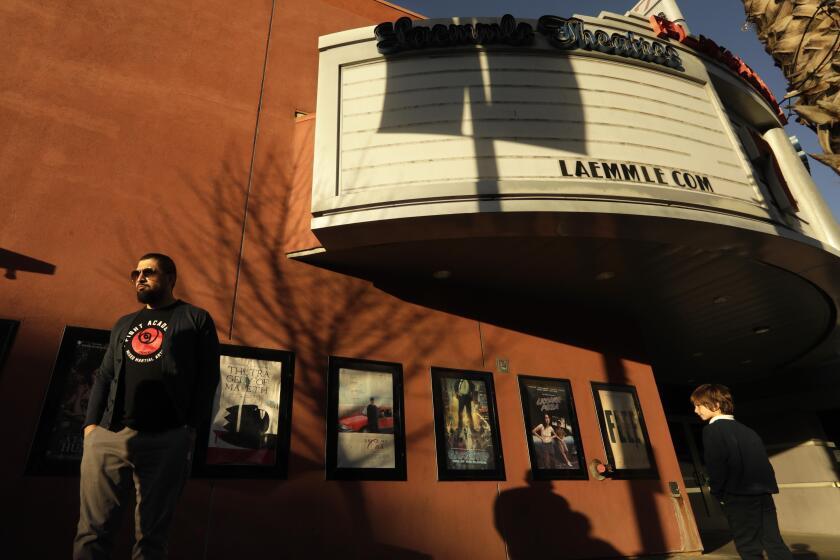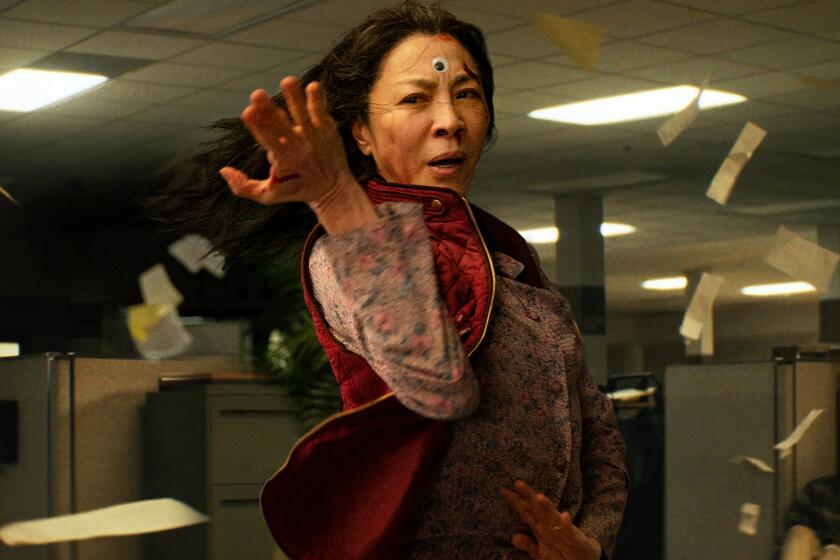‘Top Gun: Maverick’ cruised to box office heights. Will more summer movies take flight?

- Share via
The success of “Top Gun: Maverick” has lifted hopes for a robust summer box office, after the long-awaited sequel generated $160 million in North American ticket sales over its Memorial Day weekend premiere.
The airborne action blockbuster’s debut had been teed up as a do-or-die moment for moviegoing, with 59-year-old actor and producer Tom Cruise returning to the Navy aviator franchise after 36 years, seemingly on a quest to save the big screen experience through sheer force of will.
“There should be a shrine to Tom Cruise in every movie theater,” said Paul Dergarabedian, senior media analyst at Comscore.
The prayer among theater owners and studio executives is that the enthusiasm about “Top Gun: Maverick,” from Paramount Pictures and Skydance Media, will spur momentum for a run of big-budget Hollywood films looking to capture audiences’ attention during the key summer period.
Universal Pictures’ “Jurassic World: Dominion,” Disney and Pixar’s “Toy Story” spinoff “Lightyear” and Marvel Studios’ “Thor: Love and Thunder” are among the films looking to buoy a comeback for a theatrical market that has been slowly working its way to health since the COVID-19 pandemic.
The summer months, in normal times accounting for some 40% of annual domestic grosses, will show whether “Top Gun: Maverick” is part of a trend or whether its exceptional reception among critics and audiences made it an outlier.
Ticket sales in the U.S. and Canada so far this year remain about 40% lower than the same period in 2019, according to Comscore. Analysts at Bloomberg Intelligence expect full-year receipts to reach $7.5 billion, which would be a nearly 70% increase from last year but still down 34% from the pre-pandemic levels of $11.4 billion.
Cinemark, the nation’s third-largest movie theater chain, has hit the 1-million member milestone for its cinema subscription program.
The industry may be facing a box office market where, as in an elite Navy fighter pilot school, only the best will succeed. Any whiff of mediocrity and you’re grounded.
“Quality is the differentiator in getting people to go the movies right now,” said Chris Aronson, head of domestic distribution for Paramount Pictures.
On those grounds, “Top Gun: Maverick” clearly made the cut, with an outstanding 97% “fresh” score on review aggregator Rotten Tomatoes and an A-plus audience rating from polling firm Cinemascore.

It showed that older audiences, who had gotten out of the habit of moviegoing, will go back for the right films. Fifty-five percent of the opening weekend audience was over 35, reflecting the broad appeal.
With strong word-of-mouth, some analysts are estimating that “Top Gun: Maverick” could gross around $70 million during its second weekend, which would be an unusually small decline of 45% from its three-day opening. Others predict a steeper drop of about 55%.
Theaters have reason to be optimistic for the first time in a while. Thank movies like ‘Top Gun: Maverick.’
On the flip side, Focus Features’ “Downton Abbey: A New Era” had strong reviews but lacked a must-see urgency, opening with $16 million in ticket sales, about half the debut tally of its hit predecessor.
The divergent results illustrate a dynamic of the unpredictable cinema market. Movies are an increasingly winners-take-all business where the box office is dominated by a handful of massive blockbusters, leaving room for little else. That trend was well underway before the pandemic but accelerated because of the disruption wrought by the virus.
The market share taken by the weekly No. 1 films, calculated on a trailing 52-week basis, crossed 50% for the first time, according to a report this week from Cowen & Co. media analyst Doug Creutz. Before the pandemic, the average share for the top weekly films was roughly 35% to 40%. A decade ago, the No. 1 movies took up around 30% of total ticket sales.
This “unprecedented level of concentration” is “symptomatic of a theatrical exhibition industry which is now almost completely dependent on a few big blockbusters,” Creutz wrote. “Ultimately we do not think it is healthy for exhibition to be this dependent on superhero films and sequels to beloved 36-year-old movies that miraculously earn 96 Rotten Tomatoes scores.”
The thin release schedule is the result of studios postponing debuts because of pandemic-related production delays and sending some movies to streaming services. Thus, the slate this year has featured some big hits, such as “The Batman” and “Doctor Strange in the Multiverse of Madness,” followed by significant lulls.
Laemmle Theatres sold the Pasadena building in 2020 and has been operating the theater under a lease-back agreement.
“We’re still feeling the ripple effects of all these release date changes,” Dergarabedian said. “It threw the whole calendar out of whack.”
The market may become less lopsided as studios start to release new movies at a steadier clip. After the new “Jurassic World” and “Lightyear” comes Illumination Entertainment’s computer-animated comedy prequel “Minions: The Rise of Gru” on July 1, followed by Jordan Peele’s mysterious thriller “Nope” later that month.

“It’s been a lot of start-and-stop,” said Sean Gamble, president and chief executive of movie theater chain Cinemark Holdings. “As we get into the summer, for the first time we’re going to have more of a regular cadence of movies coming out every week. There needs to be that steady stream.”
But also, the lackluster business reflects a dearth of nonfranchise movies in the elusive “middle” — those with budgets greater than the cheap horror films and less than the star-studded sci-fi action-adventures. Superhero franchises still make gargantuan sums at multiplexes. Animated movies have been successful, as have some horror films.
Other genres remain in question.
Those types of pictures, including teen comedies and rom-coms, have mostly become the domain of streaming services such as Netflix, Apple TV+ and HBO Max. Competition from streaming has created a stark division between movies that must be seen on the big screen and those that can be enjoyed while folding laundry.

Studios at April’s CinemaCon in Las Vegas promised diverse slates to appeal to all audiences, but their presentations for cinema owners nonetheless focused on the big-brand characters and comic book labels viewers already know.
Are movie theaters back for real this time?
Yet there are exceptions where distributors are gambling on the power of stars, stories and filmmakers to appeal to audiences without relying on established intellectual property.
Among the riskiest bets is Warner Bros.’ “Elvis,” an epic and over-the-top musical biopic from “Moulin Rouge!” director Baz Luhrmann, starring Austin Butler as the king of rock ’n’ roll and Tom Hanks as Col. Tom Parker, planned for June 24. Theaters are pulling for a surprise hit in the normally quiet month of August with Sony Pictures’ “Bullet Train,” a high-speed thriller starring Brad Pitt.
Smaller movies remain riskier than ever, though there have been some rays of light with the success of Paramount’s Sandra Bullock-Channing Tatum comedy “The Lost City” and A24’s multiverse-hopping indie actioner “Everything Everywhere All at Once.”
“I think there are signs of hope for movies that aren’t necessarily quote-unquote blockbusters,” said Dergarabedian. “If it does become the blockbuster-fication of the movie theater experience, that’s not necessarily a great thing.”
More to Read
Inside the business of entertainment
The Wide Shot brings you news, analysis and insights on everything from streaming wars to production — and what it all means for the future.
You may occasionally receive promotional content from the Los Angeles Times.















